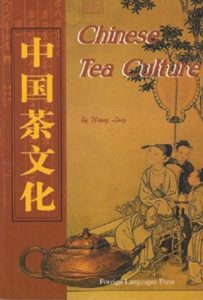In 1939 the British government expected airstrikes from Germany. So they devised a slogan to keep up civilian moral: Keep Calm and Carry On. There were signs and posters designed for the slogan to be hung in shop windows, but they never quite made it to fruition. They survived the Blitz without them, the Brits seen as stalwart in the face of danger, stuck in their routines. I remember the stories of people returning to work in half-destroyed buildings, or setting up just outside. Continue reading
Page 3 of 10
VTF 2020
The best thing about this entire self-quarantine is that all checkout times from the library have been greatly extended and I rarely leave my apartment anyways, so I’m hoarding these books.
So the Festival skipped a year and moved from winter to spring, bringing it more inline with over tea festivals. And, I assume, making it a bit more accessible to companies and attendees. The venue switched too, and as much as I liked the Dr. Sun Yat-Sen Gardens, the Nikkei Cultural Centre still offered a picturesque view, a small garden and some solid dining options for when you need something over than tea in your system.
Now, I did something a little crazy this year and signed up to present. I was offered a tasting slot as well, but ended up declining… My anxiety-stricken mind can only handle one major event at a time. Continue reading
Book: Tea. T, Eden
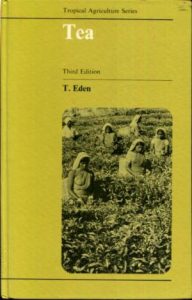 I picked this up from the public library. Unfortunately the last person to have it decided to write in it with a black felt pen of all things. And I know it was recent because in the margins where they decided to jot swaths of notes down, they went back and blanked it out with white-out tape of all things. As if that made it better.
I picked this up from the public library. Unfortunately the last person to have it decided to write in it with a black felt pen of all things. And I know it was recent because in the margins where they decided to jot swaths of notes down, they went back and blanked it out with white-out tape of all things. As if that made it better.
I cannot fathom some people.
With that mini-rant out of the way, Dr. Thomas Eden was (is?) the former director of the Tea Research Institute of East Africa. His works are those you’ll find alongside Denys Forrest’s, C.R. Harler’s and William Ukers’. Contemporaries spread out across Sri Lanka, India and Africa, they frequently reference each others’ research. Continue reading
Book: Chinese Tea Culture
I found this one poking around a used bookstore (in about… 2017? 2016? I’m behind). It’s a slim, unassuming volume, and I picked it up with a few others after flipping through it. I was struck by the Table of Contents, the quick glance I took through it, and the inclusion of book plates at the beginning; several colourful photos of historic tea pots, bowls, and paintings.
I started reading it a while ago–put it down thinking I’d finished it, and then when I picked it up again to review, realized I still had a bookmark at about the halfway mark. So I ended up rereading it anyhow (it’s 154 pages, and pretty engrossing). Before I even finished it, I’d recommended it to at least one person who was looking for information on the history of Chinese tea culture, specifically the time-period that would have influenced the development into chanoyu in Japan. Continue reading
Book: Tea Art of China
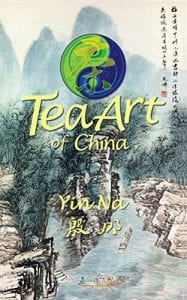 This was a book I received back at 2017’s Vancouver Tea Festival. The author had a booth at the event, and I also attended her talk on the different tea-growing regions of China.
This was a book I received back at 2017’s Vancouver Tea Festival. The author had a booth at the event, and I also attended her talk on the different tea-growing regions of China.
I never really spoke to her directly, but thought her talk was pretty interesting (I was the nerd up-front taking notes, naturally). The book was gifted by someone else running the booth as a copy to review. And then… I didn’t get around to it, as I got caught up in trying to finish my degree.
Unfortunately, the review got put on the backburner even longer–half-finished as I looked for a job and ended up losing all of my free time in the process. I had notes prepared, at one point, but I’ve since lost them. Continue reading
Scented Orange Pekoe
Working at Murchie’s has been fun both on a tea-blending side, but also in that it allows me to scratch my Tea History itch.
For those not well-acquainted with Murchie’s, it’s been around a good century and in that time has developed quite a number of blends. To keep them organized, there is a Murchie’s blending book—a big black book of quick-reference recipes done to the pound of tea (and sometimes coffee) passed down through the generations. Most are family blends, dedicated to Reverend Oldfield (an actual blend—I learned about it through a friend, a descendent of said Oldfield; he dislikes it because it has jasmine), or some place (a hotel, etcetera). It’s all done in short-hand notation, and half the fun is trying to figure out that shorthand’s legend. Continue reading
Vancouver Tea Festival 2018
The Vancouver Tea Festival came upon me again, and I almost forgot about it until I got a text out of the blue from a friend helping organize it. That could have been disappointing. Since graduating and working full-time I haven’t had nearly as much time to actually sit down with some nice tea, but I have at least been doing more reading. So I’m left with a nice little backlog of books to talk about—if I can remember what it is I want to say, or find my notes on the matter.
So I attended it a few weeks back; following it I relegated myself to my Social Coma. Big events like that don’t sit well with me (well, ‘big’ is relative; ‘big’ for me), and I usually need a good week alone to agonize over social interactions and just mentally rest. It was in the same venue, Dr. Sun Yat-Sen Chinese Garden (and if that isn’t enough to make you go, I don’t know what to say; it’s always a really nice walk-around), and most of the same vendors haunted a lot of the tables—some shuffling around between corners (places like the Chinese Tea Shop always take up a corner—extra room for their wares). Some of the new faces are what I think I’d like to focus on. Continue reading
DIY: Tea Boat
Unfortunately, draft and account problems persist, and I didn’t really have the willpower to completely retype this post in Word knowing that I would have to then reformat it once I pasted it into wordpress… So that’s this month’s excuse for delays.
I’ve wanted a tea boat for a while, something more portable and smaller than my (admittedly tiny) tea tray. However they tend to be very pricey, with the lower price-bracket being dominated by one design.
So I’d been thinking of making my own for a while; my first thought was simply to keep an eye out at thrift shops for a large saucer that would fit my gaiwan and teapots. And I did eventually find one, when I wasn’t actively looking for it; unfortunately it was at a cash-only shop, and I had none. I returned the next day with a loonie, and it was gone. Continue reading
Book: Tea: Essence of the Leaf
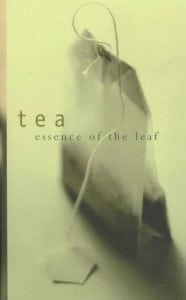 I meant for this to go up last Wednesday, but unfortunately, I lost my draft (due to server optimizations for a better teatra.de; hurray!). This means rewriting my review from memory (could have sworn I had some paper notes, but alas).
I meant for this to go up last Wednesday, but unfortunately, I lost my draft (due to server optimizations for a better teatra.de; hurray!). This means rewriting my review from memory (could have sworn I had some paper notes, but alas).
Tea: Essence of the Leaf was donated to my university tea club, and since I was the one there to accept it, I claimed dibs. I put all other books on-hold so I could read it and return it as soon as possible. Continue reading
Book: Taxing Heaven’s Storehouse (Part 1)
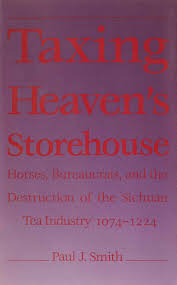 I’m back. I’ve got a lot to write about, I just have to kick myself back into writing gear again. So I’ve finished classes, and I’m graduating in June; I quit my job so I could take an extra heavy last semester and graduate sooner. I checked this book out two terms ago–normally, as long as there are no holds on a book, you can renew them indefinitely. Unfortunately, since I’m graduating in a month, I was required to return it. I’ve been reading it on and off since Christmas. I barely made it half-way through; it’s a thick book. Thus this’ going to be a two-part review, since once I get my alumni privileges I’ll be checking it out again to finish.
I’m back. I’ve got a lot to write about, I just have to kick myself back into writing gear again. So I’ve finished classes, and I’m graduating in June; I quit my job so I could take an extra heavy last semester and graduate sooner. I checked this book out two terms ago–normally, as long as there are no holds on a book, you can renew them indefinitely. Unfortunately, since I’m graduating in a month, I was required to return it. I’ve been reading it on and off since Christmas. I barely made it half-way through; it’s a thick book. Thus this’ going to be a two-part review, since once I get my alumni privileges I’ll be checking it out again to finish.
Taxing Heaven’s Storehouse (Horses, Bureaucrats, and the Destruction of the Sichuan Tea Industry, 1074-1224) unofficially belongs to a trilogy of books (that I’ve grouped together) on the evolution of the tea economy in China from about early Tang until at least the end of the ROC. I’ve already reviewed one before (Harvesting Mountains); the other is Green Gold, arguably the most well-known of the three. I intentionally left Green Gold for last; my first intent was to read them roughly ‘in order’, but Taxing Heaven’s Storehouse was such an intimidating book, I went for Harvesting Mountains first. Continue reading




